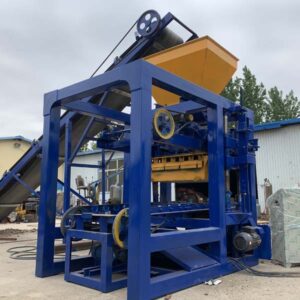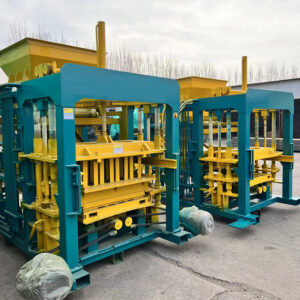Côte d’Ivoire, located in West Africa, has emerged as a promising market for brick-making machinery in recent years. This article aims to analyze the market prospects for brick-making machinery in Côte d’Ivoire, taking into account various factors such as economic growth, infrastructure development, demand for bricks, and trends in the brick-making industry.

Market Development Prospects for Brick-making Machinery in Côte d’Ivoire
Moreover, the government of Côte d’Ivoire has been actively promoting infrastructure development and urbanization, which has further boosted the demand for bricks. The government’s investment in infrastructure projects, such as roads, railways, and dams, has created a favorable environment for the growth of the brick-making machinery market. Additionally, the country’s urbanization trend has led to an increase in the construction of residential and commercial buildings, further driving the demand for bricks and brick-making machinery.
In terms of trends in the brick-making industry, there is a growing emphasis on environmental sustainability and efficiency. Manufacturers of brick-making machinery are increasingly focusing on developing machines that are energy-efficient, emit low levels of pollution, and use recycled materials. This trend is expected to continue in Côte d’Ivoire, as the country strives to achieve sustainable development.

Moreover, the adoption of advanced technologies such as automation and artificial intelligence is expected to revolutionize the brick-making industry in Côte d’Ivoire. These technologies can improve production efficiency, reduce labor costs, and enhance the quality of bricks. Manufacturers of brick-making machinery who invest in research and development to incorporate these technologies into their products are likely to gain a competitive edge in the market.
However, it should be noted that the market for brick-making machinery in Côte d’Ivoire faces some challenges. One of the main challenges is the availability of skilled labor. The brick-making industry requires skilled workers who can operate and maintain the machinery effectively. However, there may be a shortage of skilled labor in Côte d’Ivoire, which could hamper the growth of the market. To address this issue, manufacturers of brick-making machinery could consider providing training and support to local workers, helping them acquire the necessary skills.
Another challenge is the competition from imported brick-making machinery. Côte d’Ivoire’s market is open to imported products, and there may be competition from international manufacturers who offer advanced and efficient machinery. To compete with these imported products, local manufacturers of brick-making machinery need to focus on innovation, quality, and cost-effectiveness.
Despite these challenges, the prospects for the brick-making machinery market in Côte d’Ivoire remain promising. The country’s economic growth, infrastructure development, and urbanization trend are expected to continue driving the demand for bricks and brick-making machinery. Additionally, the emphasis on environmental sustainability and efficiency, as well as the adoption of advanced technologies, are expected to create new opportunities for manufacturers of brick-making machinery.
To capitalize on these opportunities, manufacturers of brick-making machinery in Côte d’Ivoire should focus on several key areas. Firstly, they should invest in research and development to develop machines that are environmentally friendly, energy-efficient, and cost-effective. Secondly, they should prioritize the training and development of skilled labor to ensure that there is a sufficient pool of workers who can operate and maintain the machinery effectively. Thirdly, they should collaborate with local and international partners to access new technologies and markets, expand their production capacity, and improve their competitiveness.
In conclusion, the market for brick-making machinery in Côte d’Ivoire has significant growth potential. With the country’s economic growth, infrastructure development, and urbanization trend, the demand for bricks and brick-making machinery is expected to increase. Manufacturers of brick-making machinery who can address the challenges of skilled labor availability and competition from imported products, and capitalize on the opportunities created by environmental sustainability and technology adoption, are likely to achieve success in this market.
However, it is important to note that success in any market requires a comprehensive understanding of local conditions and a strategic approach to market entry and expansion. Manufacturers of brick-making machinery interested in entering the Côte d’Ivoire market should conduct thorough market research, identify potential customers and competitors, and develop a clear business plan that takes into account all relevant factors. With a well-executed strategy and a commitment to quality and innovation, manufacturers of brick-making machinery can achieve significant growth and success in the Côte d’Ivoire market.

